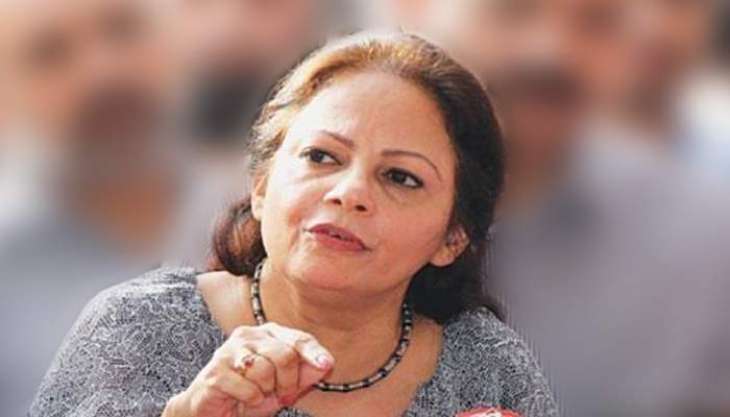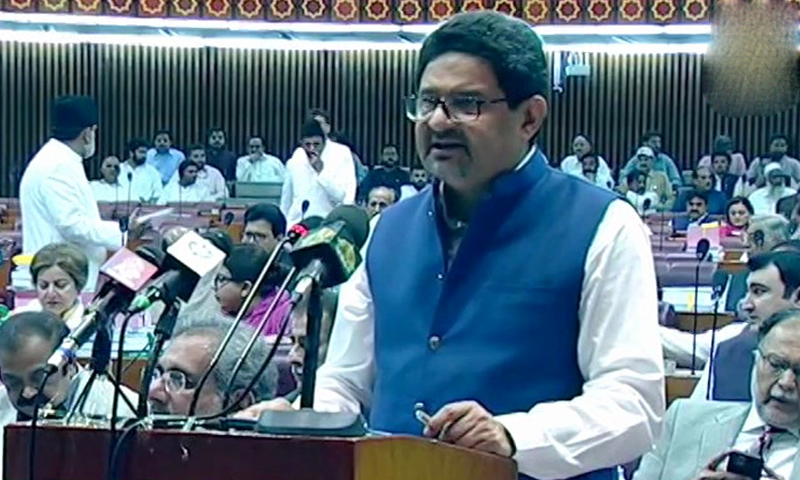ISLAMABAD ( Web News )
National Assembly on Wednesday passed the Finance Bill-2022 after clause by clause consideration and adopting certain amendments in it.
Minister of State for Finance and Revenue Aisha Ghaus Pasha moved the motion for consideration of the Finance Bill, 2022 to give effect to the financial proposals of the federal government for the year beginning on July 1, 2022.
The motion was passed with majority vote which led to the passage of Finance Bill-2022 after clause by clause reading and adopting amendments after due process of voting.

All amendments moved by the Minister of State for Finance and treasury lawmakers were adopted by the House while the amendments of opposition members including Javaria Zafar Aheer (PTI), Wajiha Qamar (PTI), Ramesh Kumar (PTI), Saira Bano (GDA), Maulana Abul Akbar Chitrali (MMAP) and an Independent MNA Mohsin Dawar were rejected by the House after voting.
According to the Rule 187 of the Rules of Procedure and Conduct of Business in National Assembly 2007, not less than four days shall be allotted for the general discussion on the budget. However, the National Assembly smoothly continued debate on the Finance Bill, 2022 for 10 days.
The formal debate started on June 13, 2022 that continued till June 24, 2022. The House also discussed recommendations of the Senate and three MNAs expressed their views on it.Minister for Finance Miftah Ismail had concluded debate on Finance Bill on June 24, 2022.
The House held discussion on the Charged Expenditure included in Demands for Grants and Appropriations for the financial year ending on June 30, 2023.

The House approved 131 demands for grants related to various departments and ministries.The total volume of the federal budget for fiscal year 2022-23 is Rs9.5 trillion with allocation of Rs 2,158 billion jointly under the Public Sector Development Programme (PSDP) and the provincial annual development programs which is one per cent up from Rs 2,135 billion last year.
The Ministry of Finance has termed the budget 2022-23 as growth budget and it is based on a well-thought-out strategy to boost the economic growth outlined in the medium-term budgetary strategy paper for FY23 to FY25.
It gives a clear roadmap of the strategic priorities, revenue and spending policies of the government.During the debate on the Finance Bill, Aisha Ghaus Pasha said there had been no pressure from International Monetary Fund (IMF) to integrate amendments in the federal budget 2022-23 saying that the changes had been made in larger interest of the country.
The amendments were made in such a way that the common man should not be affected, she said adding that the government had reduced taxes on the people having small incomes while increased tax on the higher income people.
She said the previous government agreed on some amendments with IMF that were being followed due to commitment of the State with the international monetary institution.
She said that super tax was being levied on the rich industrialists while small income segments had been given relief.
During the process, the House approved the insertion of a new clause in the Bill to impose Rs 50 per liter Petroleum Development Levy on all petroleum products.
Finance minister Miftah Ismail said the government had sought the permission to impose levy of up to Rs 50 but it had no intention to impose whole of the petroleum levy.
He informed that at present there was zero PDM on the petroleum products. The National Assembly also approved imposition of 10% “super tax” on 13 large industries.
This move will raise additional Rs 465 billion in the government revenues and help trimming the fiscal budget. The “super tax” would be imposed on the persons earning more than Rs 300 million annually who are engaged in the business of airline, automobiles, beverages, cement, chemicals, cigarette/tobacco, fertilizer, iron/steel, LNG terminal, oil marketing, oil refining, petroleum and gas exploration, pharmaceuticals, sugar, and textile.
The government had initially set the target for revenues of Federal Board of Revenue (FBR) at Rs 7.004 trillion for the fiscal year 2022-23 while due to the addition of new tax measures, the tax target has been increased to Rs 7.47 trillion.
Similarly, for other individuals whose annual income exceeds Rs150 million will be taxed at 1%; for Rs200 million at 2%; Rs250 million at 3%; and Rs300 million at 4% of their income.
Furthermore, the government also reversed the decision of providing Rs 47 billion relief to the lower and middle income salaried people. The tax exemption limit has been reversed to annual income of Rs600,000 from Rs1.2 million, whereas the fixed tax of Rs100 has been replaced with a 2.5% tax for individuals earning between Rs600,000 and Rs1.2 million.
Similarly, the persons earning between Rs 1.2 million to Rs 2.4 million per year would have to pay 12.5% of the amount exceeding Rs 1.2 million besides a fixed tax of Rs 15,000.
The individuals earning Rs2.4 million to Rs3.6 million a year will be charged at Rs165,000 plus 20% of the amount exceeding Rs2.4 million.
Those earning Rs3.6 million to Rs6 million per year will be charged at Rs 405,000 plus 25% of the amount exceeding Rs3.6 million.In the sixth slab, people with an annual income of Rs6 million to Rs12 million will be charged at 32.5% of the amount exceeding Rs6 million plus fixed amount of Rs 1.005 million.
Those earning more than Rs12 million a year will be charged at Rs2.955 million plus 35% of the amount exceeding Rs12 million.According to the Bill, duty on the import of equipment for the film industry including projectors, loud speakers and 3D glasses was abolished.

